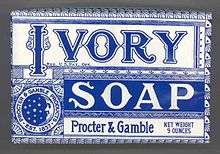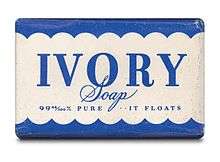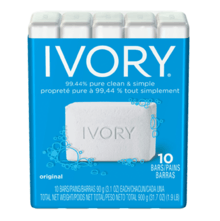Ivory (soap)
Ivory (French: Savon d'Ivoire) is a personal care and flagship brand created by the Procter & Gamble Company (P&G), including varieties of a white and mildly scented bar soap, that became famous for its claim of purity and for floating in water. Over the years, the brand has been extended to other varieties and products.
 | |
| Product type | personal care |
|---|---|
| Owner | Procter & Gamble |
| Country | United States |
| Introduced | 1879 |
| Markets | United States, Canada, Philippines (until 1999) |
| Website | https://www.ivory.com/ |
History
Early days
In 1840, the J.B. Williams Company in Glastonbury, Connecticut, manufactured soap under the name Ivorine. Williams decided to focus on its shaving soap and sold Ivorine to Procter & Gamble, which later developed Ivory.[1]
In 1879, James Norris Gamble, son of the founder and a trained chemist, developed an inexpensive white soap.[2] The name Ivory was created by Harley Procter, the founder's son, who was inspired by Psalm 45:8 in the Bible: "All thy garments smell of myrrh, and aloes, and cassia, out of the ivory palaces whereby they have made thee glad." In September 1879, Procter & Gamble trademarked "Ivory", the name of its new soap product.[3]
As Ivory is one of P&G's older products (first sold in 1879), P&G is sometimes called "Ivory Towers" and its factory and research center in St. Bernard, Ohio, is named "Ivorydale".[4]
Ivory's first slogan, "It Floats!", was introduced in 1891. The product's other well-known slogan, "99 44⁄100% Pure" (in use by 1895), was based on the results of an analysis by an independent laboratory that Harley Procter hired to demonstrate that Ivory was purer than the castile soap then available.[5]

Ivory bar soap is whipped with air in its production and floats in water. According to an apocryphal story, later discounted by the company, a worker accidentally left the mixing machine on too long and the company chose to sell the "ruined" batch, because the added air did not change the basic ingredients of the soap. When appreciative letters about the new, floating soap inundated the company, P&G ordered the extended mix time as a standard procedure. However, company records indicate that the design of Ivory did not come about by accident. In 2004, over 100 years later, the P&G company archivist Ed Rider found documentation that revealed that chemist James N. Gamble, son of the other founder, had discovered how to make the soap float and noted the result in his writings.[6]
1900s
In October 1992, Procter & Gamble market-tested a new Ivory formula, a "skin care bar" that would address customer complaints about dryness but would not float like the original.[7] In October 2001, P&G tested the sinking bar soap as part of an advertising campaign in the United States, in a six-month plan to release 1,051 soap bars that sink, among other bars that float, to see if people would notice the sinking bars, even if given a cash reward of up to $250,000.[8] The D. L. Blair company, part of Draft Worldwide, a unit of the Interpublic Group of Companies, was assigned to administer the contest.[8]

In Philippines, Ivory as shampoo and soap brand since 1986 until it discontinued in 1999 as Ivory Ultra Mild Shampoo Sachet
21st century
Ivory is currently a small brand by P&G standards. The Ivory brand includes the classic bar soap, clear liquid soap (discontinued before 2016), hair & body wash, dish liquid, and a mild laundry detergent (not a soap) product called Ivory Snow. Research in 2001 by Lehman Brothers revealed that the U.S. sales of all Ivory products, including the liquid soap and dish detergent, represented less than 1% of P&G's total worldwide sales in the 52 weeks ended September 9, 2001.[8]
Ingredients
Ivory bar soap (classic) contains: sodium tallowate, sodium cocoate or sodium palm kernelate, water, sodium chloride, sodium silicate, magnesium sulfate, and fragrance. The soap has a determined pH value: 9.5.[9]

The Ivory Dishwashing Liquid bottle does not list the products ingredients. If its composition is similar to other dishwashing liquids, however, it is a detergent rather than a soap.
New varieties of Ivory soap contain altered ingredients, such as in "Simply Ivory" (or "simplement ivory"): sodium tallowate and/or sodium palmate, water, sodium cocoate or sodium palm kernelate, glycerin, sodium chloride, fragrance, one or more of the following: coconut acid, palm kernel acid, tallow acid or palmitic acid, and tetrasodium EDTA. The additional ingredients primarily are to reduce the harshness of the soap, since additional glycerin and fatty acids are typically used for that purpose. Tetrasodium EDTA is used primarily to reduce soap scum formation. Bars of Ivory now come without the words "soap" or "float" on the packaging, and they are made with the latter formula.
In popular culture

- In the Eartha Kitt song "I Want to Be Evil", the narrator talks about posing for Ivory Soap.
- Parodying Ivory's slogan, John Frankenheimer titled his 1974 film "99 and 44/100% Dead".
- As early as the 1920s, Ivory Flakes soap powder was used to create home-made "snow" for Christmas decorations.
- A 1995 episode of Tales from the Crypt titled "99 and 44/100% Pure Horror" centers around the rich owner of a soap company and his wife.
- "99 and 44/100% pure" are the words spoken by Willy Wonka on opening the factory door in the 1971 film, Willy Wonka & the Chocolate Factory.
- Milliken, a New York City neighborhood, became known as Port Ivory, Staten Island, because of the P&G factory that was a landmark there from 1907–1991.
- The 1953 Raymond Chandler novel The Long Goodbye contains a passing reference to an 'Ivory Soap deal', a reference to the implicit cleanliness of said deal.
- In 1974, American country music singer Ronnie Milsap had a hit single composed by Eddie Rabbitt entitled "Pure Love." In an obvious reference to the Ivory soap slogan, the lyrics contain the line, "99 44⁄100 percent pure love."
- The 2013 Movie The Challenger about Richard Feynman's investigation into the 1986 Space Shuttle Challenger disaster uses "We think Ivory Soap" as a quote when Feynman asks the engineers' opinion about the probability of a successful launch.
- Before becoming a pornographic actress, Marilyn Chambers was a model for Ivory Snow. The producers of the 1972 hardcore film Behind the Green Door used Ivory Snow's "99 and 44/100 percent pure" slogan to advertise the actress' appearance in the film. The controversy helped to boost tickets sales for the film.[10][11]
See also
- Sunlight, cleaning product
References
- Rhinelander, David (October 9, 1998). "J.B. Williams put soap, Glastonbury on The Map". courant.com. Hartford Courant.
- "A Company History - Procter & Gamble Company" (PDF). Procter & Gamble. Retrieved 21 May 2020.
- "Trademark - Proctor [i.e. Procter] & Gamble Soap - Ivory Soap - No. 7,701". Library of Congress. 23 September 1879. Retrieved 21 May 2020.
- Kenny, Daniel J. (1895). Illustrated Guide to Cincinnati and the World's Columbian Exposition. R. Clarke. p. 228.
- Cox, Jim (2008). Sold on Radio: Advertisers in the Golden Age of Broadcasting. McFarland. p. 213. ISBN 978-0-7864-5176-0.
- Mikkelson, Barbara (May 19, 2011). "Origins of Ivory soap". Snopes.com. Retrieved 2011-11-28.
- "New Ivory gets that sinking feeling". Lakeland Ledger. AP. October 23, 1992. Retrieved 2015-02-06.
- Levere, Jane L. (October 25, 2001). "The Media Business: Advertising; Ivory soap uses a bar that sinks, a $250,000 contest and old-style packaging to increase sales". The New York Times. Retrieved 2015-02-06.
...advertising campaign, reports, "1,051 of the bars will sink, instead of float".
- "Determining Your Soap's pH". 2006-11-09. Archived from the original on November 9, 2006. Retrieved 2016-03-26.
- Goupil, Helene; Krist, Josh (2005). San Francisco: The Unknown City. Arsenal Pulp Press. p. 239. ISBN 9781551521886.
- Allyn, David Smith (2001). Make Love, Not War: the sexual revolution, an unfettered history. Taylor & Francis. p. 235. ISBN 9780415929424.